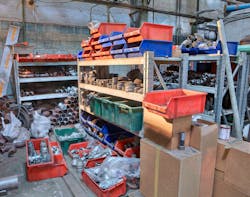Storage Considerations for an Expanding Plumbing Business
If you’re currently keeping supplies for your plumbing company in your van or garage, your expanding business may soon outgrow its storage area and need to rent out a dedicated space for its needs.
Pros and Cons
Expansion to the point of needing extra storage isn’t for every business. Large-scale expansion is often a risky venture that involves collateral-backed bank loans and other financing options due to the high costs of facility deposits, hiring and recruitment, and inventory and supplies. If your growth doesn’t go well and you default on your loans, you could be losing actual assets that you pledge to your lender.
Growth can also reduce the amount of control you have over your operations and service quality. Handing over the keys can be incredibly nerve-wracking if you’re not 100% confident in your management team.
However, expansion can be worth the risk, and you can even reduce your risk with a smart expansion plan. Large-scale growth gives you the opportunity to enter new markets and further establish your company as a market leader. If your plumbing services have been steadily rising in demand and your profits have consistently risen, it’s easier to plan for growth now—while you have time to create a strong foundation—than when you’re too busy to keep up with your own expansion.
How Much Space Do You Really Need?
Expanding too fast is one of the most common downfalls for growing businesses. While some companies may need a large, private facility as their first upgrade, most plumbing businesses can benefit from growing incrementally—perhaps going from a van to a shed or a self-storage unit before renting a private warehouse. This slow but steady storage growth can help your business spend within its means instead of wasting money with the expectation of high returns later.
If you need a place to complete your administrative duties, consider using a home office space and hiring remote workers. This is considerably cheaper than renting from a dedicated office park, which means you can have extra funds to go toward storage expenses. Here are a few ways you can clear up your home to create a functional office:
● Invest in a corner desk to fit your workspace into tight angles
● Purchase furniture with built-in storage to neatly organize your room
● Use a compact desk lamp to avoid taking up floor space with your light
Identify Your Must-Have Amenities
No matter where you’re storing your plumbing tools and supplies, you need storage space that offers all the features you need. For plumbing businesses, one of the most important amenities to consider is security. If you’re keeping your supplies at home, using a deadbolt-style lock can offer maximum security so you can avoid costly theft that leads to major business disruptions. If you’re renting, 24/7 surveillance is ideal.
Storage spaces should also make it possible for you to organize all your supplies, perhaps into neatly stacked and labeled storage bins.
Create a Strategic Growth Plan
Before you start investing in your business growth, it’s important to have a plan ready to keep your expansion on track. To start, you can create an organizational chart that showcases who’s on your team and what positions you need to fill.
Your strategic business growth plan should also include details about your business finances. Craft a budget that identifies your expected expansion expenses—including the cost of moving labor—as well as how you’re financing those expenses.
Additionally, you’ll need a logistical plan that maps out expansion details like how you’ll take your current supplies from Point A to Point B, as well as who will ultimately be working at your storage or office facilities instead of at home.
Build the Ideal Space
If you choose to expand your business to the point of needing new employees and extra storage space, you have the chance to bring your thriving business to new, fresh markets. This can be a risky financial move since it often requires the use of collateral-backed loans and the loss of control over the lower levels of your company.
However, large-scale expansion can be incredibly rewarding, too. With slow and steady growth—including that of your storage facilities—you can limit some of your biggest costs while making room for new services, new customers, new tools, and new employees.
Sam Bowman writes about people, tech, wellness, and how they merge. He enjoys getting to utilize the internet for community without actually having to leave his house. In his spare time he likes running, reading, and combining the two in a run to his local bookstore.
About the Author
Sam Bowman
Sam Bowman writes about people, tech, workers, and how they merge. He enjoys getting to utilize the internet for the community without actually having to leave his house. In his spare time, he likes running, reading, and combining the two in a run to his local bookstore.
